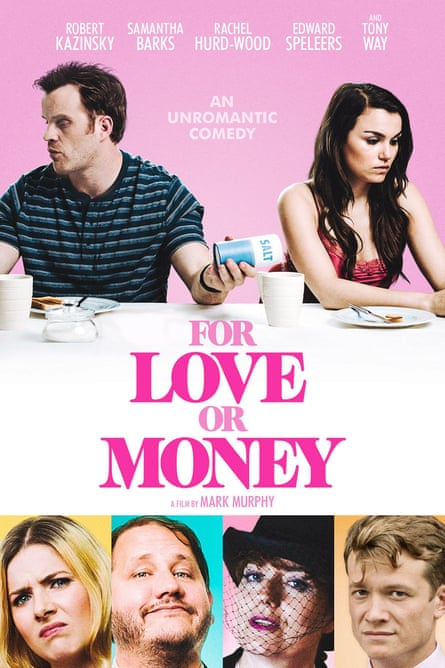Only the most geeky of movie buffs will have heard of him but Alan Latham is one of the UK’s most prolific film producers.
Credited on 81 releases dating back to 1996, according to the online film bible IMDb.com, Latham has been behind a string of barely known films fronted by much better known actors.
They have included Four Weddings and a Funeral’s Anna Chancellor performing a cameo in Latham’s 2019 romantic comedy For Love or Money, Samuel West (All Creatures Great and Small, Slow Horses, The Crown), playing a policeman in the producer’s 2020 thriller, Gatecrash, and Laura Fraser (Better Call Saul, Breaking Bad) topping the bill in his 2019 sci-fi mystery, Dark Encounter.

None of those films are among those actors’ greatest triumphs: the top-ranked scored 5.6 out of 10 when reviewed on IMDb.com, while the Los Angeles Times called For Love or Money an “uninspired Britcom” that gave “a particular nod to the classic Four Weddings and a Funeral, but none of the grace”.
Yet, if you look hard enough, the movies do seem to present an intriguing backstory.
By combining internal documents seen by the Guardian – alongside information disclosed in financial filings by the films’ holding companies – it is tempting to guess how the producer has shrugged off commercial and artistic disappointments to continue operating in the business on such a prolific scale.
Latham’s movies, it seems, have been funded almost entirely by the UK taxpayer.
Film-making and tax
Film-making and tax have long had an uneasy relationship in the UK – perhaps best illustrated by historical media storms involving celebrities such as David Beckham, Gary Lineker and Ant and Dec investing in carefully structured schemes that resulted in losses that could be offset against income tax.
While some of the products from this era were found by HMRC not to be “legitimate investments”, there are good reasons behind the principle of governments assisting film-makers, which explains why the US president, Donald Trump, has threatened to impose steep tariffs on films made outside the US.
As the chancellor, Rachel Reeves, put it, when announcing an increase in the tax relief for independent films last year: “The creative industries are a crucial part of our economy … By supporting growth in this vibrant sector, we can create jobs and continue to show Britain at its best around the world.”
In the UK, that support is most visibly achieved via a tax credit. The maths is often complex – but the rule of thumb has always been that the benefit equates to about 20% of each production’s budget.

So, if a producer wants to make a small film with a UK budget of £1m, they should be entitled to about £200,000 in tax credits. Once they have provided the necessary costs and invoices, film-makers can claim that benefit as cash, before their film has even been released.
The story of Latham’s moviemaking seems to involve him fully embracing this scheme, all of which is set out in the public accounts of each of the films’ holding companies.
For example, For Love or Money had a budget of £4.3m and claimed tax credits of £994,353 – or 23% of the budget – accounts filed with Companies House suggest. So the sums roughly add up, yes? Well, maybe not. If you actually sit through the 95 minutes of the film, you might ask if the product really cost that much, given its budget feel and the calibre of the script.
There are some documents that add weight to such scepticism. The Guardian has seen a spreadsheet of the film’s budget – which contains enough detail to list parking tickets issued to crew members. It also includes hundreds of lines of other costs, such as payments to cast members and a £100,000 fee to Latham, before recording the “grand total” of the film’s budget to be £1.3m. Oddly, that is £3m short of the figure recorded in the published accounts.
Separate records from Lloyd’s of London, also seen by the Guardian, appear to show the film was insured based on “estimated gross production costs” of £1.4m. These much smaller figures imply a tax credit due of up to £280,000 – nowhere near the almost £1m of taxpayer support that Companies House accounts set out was claimed – raising questions as to whether the state assistance was almost four times too rich.
Gatecrash contains the same subplot. The publicly filed accounts imply a total budget of about £4.5m with claimed tax credits of £868,324 (so, about 19% of the “budget”). Yet one internal document seen by the Guardian – which details costs such as hire fees for “costumes” plus “hair/make up & prosthetics kit” – sets out how the Gatecrash budget totalled £1m. If the document is correct, it would suggest this film was also largely paid for by the exchequer.
There is a similar story around Dark Encounter, where the accounts appear to show a £6.6m budget and £1.3m of claimed tax credits. Yet, confusingly, the film’s director, Carl Strathie, has suggested that he was working under much tighter financial constraints, posting on X in 2024 that the budget for the film was only £1.5m.
Strathie also stated that another of his films made with Latham – the sci-fi thriller Solis that starred The Walking Dead actor Steven Ogg – cost £700,000 to make and included cost savings such as the spaceship set having pilot seats that were “gaming chairs … put into MDF frames”. That film, which only featured Ogg on screen, was paid £970,000 by the taxpayer on a £5m budget, according to the publicly filed accounts.

If those numbers at Companies House are correct, that appears to have made Solis more costly than a comparable film in the same genre: Sony Pictures’ 2009 low-budget sci-fi film Moon starred the future Oscar winner Sam Rockwell plus the voice of double Academy Award winner Kevin Spacey as an artificial intelligence character. It cost a reported $5m (£3.8m).
Strathie did not respond when approached for comment via his accountants but both of his social media posts appear to have been taken down since the Guardian began asking questions about Latham’s financing.
What does remain on the record, however, is how much one of Strathie’s films took at the box office. Dark Encounter grossed a total of $4,672, seemingly exclusively from the United Arab Emirates, according to IMDb.com’s takings analysis service, Box Office Mojo. Meanwhile, none of For Love or Money, Gatecrash or Solis get a mention for box office takings.
An unsatisfactory ending?
So if the real intrigue in a Latham film is contained within its finances, has anybody tried to account for the apparent discrepancies?
In order to be able to keep film tax credits after they have been paid out, a final certificate needs to have been granted by the British Film Institute (BFI). Yet, neither For Love or Money, Gatecrash, Dark Encounter nor Solis have received one, according to the BFI. Meanwhile, Gatecrash Film Ltd – the company behind the picture of the same name – never will get its certificate, having been dissolved in September 2025.
A spokesperson for the BFI said: “The BFI has a legal gateway through which we can share information regarding compliance with HMRC and DCMS, and we work closely with them to uphold the integrity of the system.”
HMRC did not comment.
All of which appears to leave filmgoers with an unsatisfactory finale: if Latham really is the most prolific UK film producer you’ve never heard of, he is also one you never hear from.
The Guardian attempted to contact him directly in order to seek comment, as well as via his family and his lawyers. The producer did not respond.

 1 month ago
45
1 month ago
45

















































